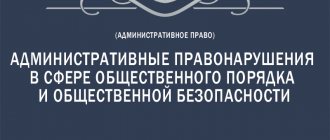Sanctions for the simultaneous commission of several administrative crimes
The Administrative Code identifies ten types of punishment, the main place among which is occupied by such a type of sanction for administrative offenses as a fine. In general, the regulatory legal act reflects the following penalties:
- Warning.
- Administrative fine (the Administrative Code gives it the main place among other types).
- Confiscation.
- Deprivation of individuals of special opportunities and rights.
- Arrest.
- Expulsion from the Russian Federation.
- Suspension of labor activity.
- Disqualification.
- Prohibition of attending sports competitions.
- Corrective work.
When committing one administrative offense, one (main) punishment or two (additional along with the main) punishment may be applied to a person. If the offender is assigned two measures, and one of them cannot be implemented for a number of reasons, the second one is applied.
https://www.youtube.com/watch?v=upload
For example, the following measures are applied as the main types of sanctions: fine for an administrative offense, warning, arrest, deprivation of special rights, disqualification, suspension of labor activity, compulsory work.
Additional penalties include confiscation, deprivation of a driver’s license with the right to drive a motor vehicle, deportation from the territory of the Russian Federation, and a ban on attending sporting events.
Some offenders commit multiple illegal acts at once. For such cases, the legislator has established a special procedure for applying sanctions against criminals.
According to the norms of the Code of Administrative Offenses, if a citizen or legal entity has committed two or more offenses, penalties are applied to each of them. If one administratively punishable act (action or inaction) was committed, which includes two or more offenses, and if sanctions for them are provided for in several articles, the penalty is imposed according to the norms of the most stringent article.
At the same time, administrative sanctions are imposed using not only basic, but also additional penalties.
The imposition of an administrative fine and other sanction measures for offenses provided for by the Code occurs within the framework established by law. When establishing a specific type and amount of punishment, the personality of the offender, aggravating or mitigating circumstances, as well as the financial situation of the person are taken into account.
Sometimes exceptional circumstances arise when, due to the financial situation of the guilty person and the nature of the offense committed, the court imposes an administrative fine, the amount of which is below the established minimum amount.
For example, for individuals the smallest amount of a monetary penalty is ten thousand rubles, for officials - fifty thousand rubles, and for legal entities - one hundred thousand rubles. At the same time, the legislator has established that the imposition of a fine cannot be less than half the norm established by law.
If an individual has violated the law in the field of psychotropic, narcotic or other dangerous substances, the court has the right to order the violator a compulsory medical examination, preventive measures or treatment for the relevant type of addiction.
When applying sanctions measures, the rule applies. To impose punishment and determine the amount of an administrative fine or other penalty in relation to one person for committing the same illegal act.
If the culprit is given an administrative penalty, he is not exempt from performing the action for which he was charged with the specified punishment.
The Code of Administrative Offenses of the Russian Federation in Articles 4.6, 4.5 and 4.8 specifies the terms for imposing administrative penalties and the statute of limitations for bringing to justice. For example, the collection of an administrative fine from an official, the amount of which is established by the court, cannot be made later than three months after the day the illegal actions were performed. If the case is examined by another body, the maximum period is reduced to two months.
The legislation of the Russian Federation defines categories of citizens to whom certain punitive measures cannot be applied for administrative offenses committed.
Fines cannot be imposed on soldiers, sailors, sergeants or foremen who are in military service by conscription, as well as cadets of military educational institutions until the day a contract is concluded with them.
The use of confiscation (ammunition, weapons or items for hunting or fishing) as a form of punishment cannot be carried out in relation to people for whom this is the only means or source of income.
Administrative arrest cannot be applied to pregnant women or women with children under fourteen years of age, minors, military personnel, disabled people of the first or second group, employees of the state fire service, citizens with special ranks of an employee of the investigative body (internal affairs bodies, penal institutions), employees customs, employees from the drug control department and the like.
These categories of persons also cannot be sentenced to correctional labor, with the exception of women with children. Only women with children under three years of age are exempt from this type of penalty.
We suggest you read: What punishment can a criminal incur for theft?
Administrative deportation as a sanction measure is not applied to foreign military personnel.
https://www.youtube.com/watch?v=https:accounts.google.comServiceLogin
After considering questions about the purposes and essence of administrative penalties, we can conclude that any of the above penalties are enshrined in the relevant Code and are described in such a way that, despite the imposition of certain sanctions on a citizen, the rights and freedoms of all citizens are compulsorily respected .
The punishments in question are usually expressed in the impact on a person morally and (or) financially. Namely, these include such coercive measures as:
- A warning is an official censure of a violator in writing. It is established only for the first time an offense has been committed and in the absence of harm caused or threat to human life and health, animals, the environment, objects of cultural heritage, state security, in the absence of a threat of natural disasters and property damage.
- A fine is a monetary penalty, the maximum amount of which depends on the violations committed and is prescribed in Article 3.5 of the Code of Administrative Offenses of the Russian Federation. As for the minimum amount of this penalty, then, according to the same source of law, the fine cannot be less than 100 rubles, and for committing traffic offenses - 500 rubles.
- Confiscation is the forced seizure into state ownership of the instrument or subject of an administrative violation.
- Deprivation of an individual of a special right. Administrative penalties of this kind are applied for systematic or gross violations of the procedure for using the right previously granted to the offender (for example, deprivation of a driver’s license). The period of such deprivation cannot be less than one month and more than 3 years.
- Arrest is the detention of an individual in conditions of isolation from society. The legislator provides, in general, a maximum period of arrest of 15 days, and in cases of certain categories of violations - up to 30 days (for example, for violating the state of emergency).
- Administrative deportation from the borders of the Russian Federation is a forced, controlled movement of foreign persons or stateless persons outside the country.
- Suspension of activities is a temporary cessation of the activities of legal entities or citizens engaged in business without forming a legal entity. Such an administrative penalty is a punitive measure in cases where there is a threat to the life or health of people, the occurrence of infection, epidemic, man-made disasters, radiation accident, and also if the offender has committed actions in the field of trafficking in narcotic, psychotropic substances, laundering of illegally obtained income, and financing of terrorism, turnover and production of alcohol and alcohol-containing products, management procedures, public safety and order, urban planning, transport security, property protection, certain types of activities for citizens of other countries and stateless persons, as well as in the field of attracting them to work at retail facilities . Suspension of activities is established for a period of up to 90 days. In situations where the circumstances that led to the imposition of this punishment are lost, the penalty is canceled by the court or official ahead of schedule.
- Disqualification is a ban on holding positions in the federal state civil service, similar structures of constituent entities of the Russian Federation, etc. This measure is established for a period of 6 months to 3 years.
- A ban on attending sporting events is a temporary restriction of a citizen’s right to be in the venues of official sporting events on the days they are held. This administrative penalty can be imposed for a person’s previous violation of behavior at a similar event and can range from 6 months to 7 years.
- Correctional work is the performance by an offender of compulsory community service free of charge in his free time. The duration of this punishment can range from 20 to 200 hours, while a person can work no more than 4 hours per day.
The legislator establishes the procedure for imposing administrative penalties in cases where a person has committed several criminal acts.
Thus, according to the Code of Administrative Offenses of the Russian Federation, when two or more administrative offenses are committed, punishment is imposed for each of them. And when one action (inaction) is committed, which contains elements of several offenses, liability for which is provided for by two or more articles, the punishment is imposed in the form of the most severe of sanctions.
In this case, the imposition of an administrative penalty can be carried out using additional administrative penalties, which are provided for by each of the relevant sanctions.
Basic rules for applying penalties
Shortened statutes of limitations apply in the following areas:
- Sport.
- Referendums, elections, rallies, processions, demonstrations.
- State regulation of prices and tariffs.
- Lotteries and gambling.
- Shared construction of apartment buildings.
- Agricultural cooperatives.
- Activities of LLC and JSC.
- Bankruptcy.
- Financing of terrorism.
- Enforcement proceedings.
- Fire and industrial safety.
- Production of alcohol and alcohol (ethyl).
- Procurement area.
- Labor and migration legislation.
- Antimonopoly legislation – failure to provide required information or reporting false information.
We invite you to read: How dismissal occurs on a day off: a detailed description
An extended statute of limitations (one year) applies to violations of budget or customs legislation, two years for failure to comply with party legislation, three years for countering terrorism, six years for preventing corruption.
Thus, it can be established that the statute of limitations for financial violations is much longer than in other areas.
In relation to a person who has committed an administrative offense, the term of punishment is counted from the moment the appropriate sanction is imposed.
If there are exceptional circumstances, taking into account the property status of the accused and the nature of the act committed, the court may impose a penalty in the form of a fine, the amount of which is less than the minimum amount established by law. So, for citizens it is at least 10,000 rubles, for officials - at least 50,000 rubles, and for legal entities - at least 100,000 rubles. In this case, the imposed fine cannot be less than half the minimum penalty established by law.
If a citizen has violated the law in the field of narcotic, psychotropic or other dangerous substances, the court may order him a compulsory medical examination, preventive measures or treatment for addiction.
The same person or legal entity cannot be punished twice for committing the same offense.
The imposition of an administrative penalty does not relieve a person from the obligation to perform those actions for failure to perform which he was given the appropriate punishment.
Such offenses include violation of laws relating to:
- export control, internal waters, continental plume, territorial sea, exclusive economic zone of the Russian Federation, cartography and geodesy, names of geographical objects;
- environmental protection, energy saving, health protection, sanitary and epidemiological well-being of people;
- protecting minors from information that harms them;
- taxes and fees;
- road safety (Articles 12.8, 12.24, 12.26, 12.27 (Part 3) and 12.30 (Part 2));
- copyrights, trademarks, consumer protection;
- use of nuclear energy, electric power;
- activities of credit institutions, microfinance enterprises, pawnshops, the securities market, insurance, clearing activities, trading, investment and pension non-state funds;
- advertising;
- sports (in the part that concerns the requirements for the regulations of official sporting events);
- referendums, elections, rallies, demonstrations and processions;
- state regulation of tariffs and prices, including utilities, natural monopolies;
- lotteries, gambling;
- shared construction of houses (apartment buildings);
- agricultural cooperation;
- activities of limited liability companies and joint-stock enterprises;
- terrorist financing;
- bankruptcy;
- enforcement proceedings;
- fire and industrial safety, cultural heritage protection;
- spheres of procurement, services and work to guarantee state and municipal needs (Article 7.29-7.32, 19.5 (Part 7), 19.7.2 of the Code of Administrative Offenses of the Russian Federation), as well as procurement, services and work by certain categories of legal entities (Article 7.32.3, 19.5 (part 7.2), 19.7.2-1 Code of Administrative Offenses of the Russian Federation);
- production of ethyl alcohol and alcohol;
- violations in the field of patent, currency, antimonopoly, labor legislation, rules for the stay or residence of foreign citizens in the country, legislation in the national payment system, misuse of insider information and market manipulation.
A similar statute of limitations applies for failure to provide or untimely provision of information to the federal antimonopoly body upon its request, or for the submission of knowingly false data.
For some offenses, the legislator provides a statute of limitations of one year. These include violations of customs or budget legislation. A two-year statute of limitations is provided for failure to comply with legislation on political parties (Article 5.64-5.68 of the Administrative Code). Three years - for violating the legislation on countering terrorism. Six years - for failure to comply with anti-corruption legislation.
In cases where an administrative penalty in the form of disqualification is provided for committing a crime, a citizen who has violated the law may be punished no later than one year from the date of its commission or from the date of its discovery, if the offense is ongoing.
In situations where anti-doping or prevention requirements in sport are violated, in terms of the use of a prohibited substance and (or) a prohibited method, the statute of limitations begins to run from the moment the conclusion is received from a laboratory that has been accredited by the World Anti-Doping Agency.
And the statute of limitations for crimes committed in Antarctica begins from the moment the relevant competent authority received the materials of the case about this offense.
A person who has committed administrative offenses is considered subject to appropriate sanctions from the date the decision to impose a punishment comes into force until the end of one year from the period intended for the execution of administrative penalties.
We invite you to read: How to sell an apartment if there is a share of a minor child 2020










